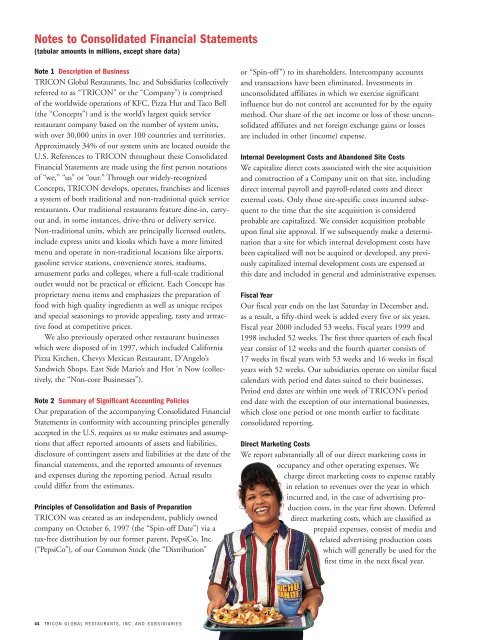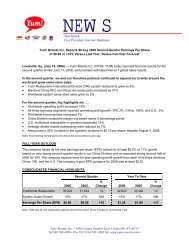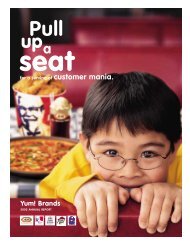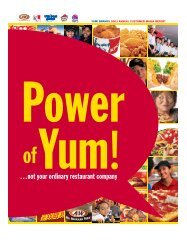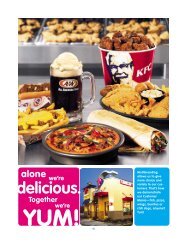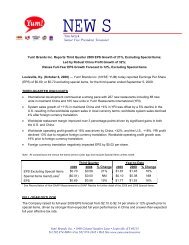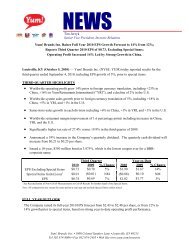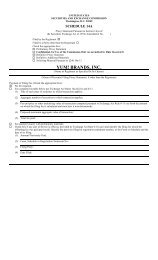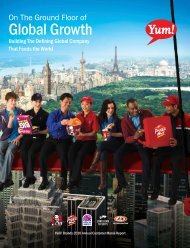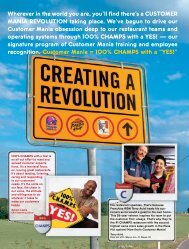2000 Annual Report - Yum!
2000 Annual Report - Yum!
2000 Annual Report - Yum!
Create successful ePaper yourself
Turn your PDF publications into a flip-book with our unique Google optimized e-Paper software.
Notes to Consolidated Financial Statements<br />
(tabular amounts in millions, except share data)<br />
Note 1 Description of Business<br />
TRICON Global Restaurants, Inc. and Subsidiaries (collectively<br />
referred to as “TRICON” or the “Company”) is comprised<br />
of the worldwide operations of KFC, Pizza Hut and Taco Bell<br />
(the “Concepts”) and is the world’s largest quick service<br />
restaurant company based on the number of system units,<br />
with over 30,000 units in over 100 countries and territories.<br />
Approximately 34% of our system units are located outside the<br />
U.S. References to TRICON throughout these Consolidated<br />
Financial Statements are made using the first person notations<br />
of “we,” “us” or “our.” Through our widely-recognized<br />
Concepts, TRICON develops, operates, franchises and licenses<br />
a system of both traditional and non-traditional quick service<br />
restaurants. Our traditional restaurants feature dine-in, carryout<br />
and, in some instances, drive-thru or delivery service.<br />
Non-traditional units, which are principally licensed outlets,<br />
include express units and kiosks which have a more limited<br />
menu and operate in non-traditional locations like airports,<br />
gasoline service stations, convenience stores, stadiums,<br />
amusement parks and colleges, where a full-scale traditional<br />
outlet would not be practical or efficient. Each Concept has<br />
proprietary menu items and emphasizes the preparation of<br />
food with high quality ingredients as well as unique recipes<br />
and special seasonings to provide appealing, tasty and attractive<br />
food at competitive prices.<br />
We also previously operated other restaurant businesses<br />
which were disposed of in 1997, which included California<br />
Pizza Kitchen, Chevys Mexican Restaurant, D’Angelo’s<br />
Sandwich Shops, East Side Mario’s and Hot ’n Now (collectively,<br />
the “Non-core Businesses”).<br />
Note 2 Summary of Significant Accounting Policies<br />
Our preparation of the accompanying Consolidated Financial<br />
Statements in conformity with accounting principles generally<br />
accepted in the U.S. requires us to make estimates and assumptions<br />
that affect reported amounts of assets and liabilities,<br />
disclosure of contingent assets and liabilities at the date of the<br />
financial statements, and the reported amounts of revenues<br />
and expenses during the reporting period. Actual results<br />
could differ from the estimates.<br />
Principles of Consolidation and Basis of Preparation<br />
TRICON was created as an independent, publicly owned<br />
company on October 6, 1997 (the “Spin-off Date”) via a<br />
tax-free distribution by our former parent, PepsiCo, Inc.<br />
(“PepsiCo”), of our Common Stock (the “Distribution”<br />
44 TRICON GLOBAL RESTAURANTS, INC. AND SUBSIDIARIES<br />
or “Spin-off”) to its shareholders. Intercompany accounts<br />
and transactions have been eliminated. Investments in<br />
unconsolidated affiliates in which we exercise significant<br />
influence but do not control are accounted for by the equity<br />
method. Our share of the net income or loss of those unconsolidated<br />
affiliates and net foreign exchange gains or losses<br />
are included in other (income) expense.<br />
Internal Development Costs and Abandoned Site Costs<br />
We capitalize direct costs associated with the site acquisition<br />
and construction of a Company unit on that site, including<br />
direct internal payroll and payroll-related costs and direct<br />
external costs. Only those site-specific costs incurred subsequent<br />
to the time that the site acquisition is considered<br />
probable are capitalized. We consider acquisition probable<br />
upon final site approval. If we subsequently make a determination<br />
that a site for which internal development costs have<br />
been capitalized will not be acquired or developed, any previously<br />
capitalized internal development costs are expensed at<br />
this date and included in general and administrative expenses.<br />
Fiscal Year<br />
Our fiscal year ends on the last Saturday in December and,<br />
as a result, a fifty-third week is added every five or six years.<br />
Fiscal year <strong>2000</strong> included 53 weeks. Fiscal years 1999 and<br />
1998 included 52 weeks. The first three quarters of each fiscal<br />
year consist of 12 weeks and the fourth quarter consists of<br />
17 weeks in fiscal years with 53 weeks and 16 weeks in fiscal<br />
years with 52 weeks. Our subsidiaries operate on similar fiscal<br />
calendars with period end dates suited to their businesses.<br />
Period end dates are within one week of TRICON’s period<br />
end date with the exception of our international businesses,<br />
which close one period or one month earlier to facilitate<br />
consolidated reporting.<br />
Direct Marketing Costs<br />
We report substantially all of our direct marketing costs in<br />
occupancy and other operating expenses. We<br />
charge direct marketing costs to expense ratably<br />
in relation to revenues over the year in which<br />
incurred and, in the case of advertising production<br />
costs, in the year first shown. Deferred<br />
direct marketing costs, which are classified as<br />
prepaid expenses, consist of media and<br />
related advertising production costs<br />
which will generally be used for the<br />
first time in the next fiscal year.


